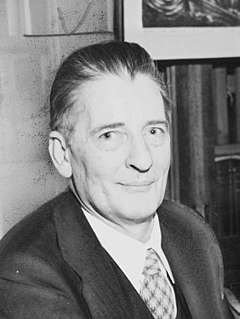A Quote by Martin Amis
Every writer hopes or boldly assumes that his life is in some sense exemplary, that the particular will turn out to be universal.
Related Quotes
A willing, cheerful worker, with his heart in his job, will turn out more work and more satisfactory work in 44 hours than an unwilling worker, dissatisfied with his conditions, will turn out in 54 hours. It is good business, therefore, for every employer to go as far as he possibly can in reaching a schedule agreeable to his people.
If one advances confidently in the direction of his dreams, and endeavors to live the life which he has imagined, he will meet with a success unexpected in common hours. He will put some things behind, will pass an invisible boundary; new, universal, and more liberal laws will begin to establish themselves around and within him; or the old laws be expanded, and interpreted in his favor in a more liberal sense, and he will live with the license of a higher order of beings.
The very act of writing assumes, to begin with, that someone cares to hear what you have to say. It assumes that people share, that people can be reached, that people can be touched and even in some cases changed. So many of the things in our world lead us to despair. It seems to me that the final symptom of despair is silence, and that storytelling is one of the sustaining arts; it’s one of the affirming arts. A writer may have a certain pessimism in his outlook, but the very act of being a writer seems to me to be an optimistic act.
My best experience as a writer was working with Michael Ondaatje. He let me dismantle his novel, reimagine it, and still had dinner with me and gave me good notes. But the best thing about writing has been the writer's life, the sense of being expressed, the ownership of the day, the entirely specious sense of freedom we have, however slave we are to some boss or other. I wouldn't trade it for any other life.
Anybody can find out if he is a writer. If he were a writer, when he tried to write of some particular day, he would find in the effort that he could recall exactly how the light fell and how the temperature felt, and all the quality of it. Most people cannot do it. If they can do it, they may never be successful in a pecuniary sense, but that ability is at the bottom of writing, I am sure.
There comes a time in every life when the past recedes and the future opens. It's that moment when you turn to face the unknown. Some will turn back to what they already know. Some will walk straight ahead into uncertainty. I can't tell you which one is right. But I can tell you which one is more fun.
The kind of hope that I often think about…I understand above all as a state of mind, not a state of the world. Either we have hope within us, or we don’t. It is a dimension of the soul It’s not essentially dependent upon some particular observation of the world or estimate of the situation. Hope is not the conviction that something will turn out well, but the certainty that something makes sense, regardless of how it turns out.
Before my book, 'California,' came out, I had modest hopes for it. Or, let's put it this way - I had the same hopes that every literary fiction writer in America has: I wanted the novel to be well-received, critically. As for sales? I didn't want it to disappoint, but I didn't expect it to be a best-seller, either.







































